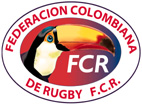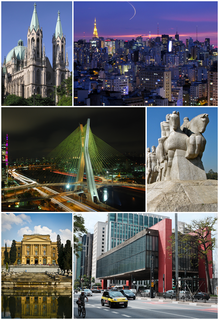The Trinidad and Tobago national rugby union team has thus far not qualified for the Rugby World Cup, but has participated in qualifying tournaments since 1999. They are classed as a tier-three nation by World Rugby.

The Bermuda national rugby union team represents Bermuda in the sport of rugby union. Bermuda have thus far not played in a Rugby World Cup, but have participated in qualifying tournaments.

The Colombia national rugby union team is classified as a tier three nation by the International Rugby Board (IRB). They have thus far not qualified for a Rugby World Cup, but have participated in qualifying tournaments. Colombia made their debut against Mexico in 1996. In 2018, the Colombians won their first significant international honour, winning the inaugural Americas Rugby Challenge, the 'B' championship to the Americas Rugby Championship.

In the American Region for Rugby World Cup Qualifying, two teams, Canada and USA, qualified directly to the world cup and the third place, Uruguay, entered a playoff against the third place European team and the second place African and Asian teams.

The Americas Rugby Championship, often informally called the Americas' Six Nations, is an annual international rugby tournament between six North and South American nations: Argentina, Brazil, Canada, Chile, the United States and Uruguay. The current international tournament is the second format of the competition to bear the name.
The 2011 South American Rugby Championship "A" was the 33rd edition of the two tiered competition of the leading national rugby union teams in South America.
The 1971 South American Rugby Championship was the seventh edition of the competition of the leading national Rugby Union teams in South America.
The 1973 South American Rugby Championship was the eighth edition of the competition of the leading national Rugby Union teams in South America.
The 1975 South American Rugby Championship was the ninth edition of the competition of the leading national Rugby Union teams in South America.
The 1977 South American Rugby Championship was the tenth edition of the competition of the leading national Rugby Union teams in South America.
The 2002 South American Rugby Championship "B" was the third edition of the competition of the second level national Rugby Union teams in South America.
The 2003 South American Rugby Championship "B" was the fourth edition of the competition of the second level national Rugby Union teams in South America.
The 2004 South American Rugby Championship was the 26th edition of the competition of the leading national Rugby Union teams in South America.
The 2005 South American Rugby Championship "B" was the sixth edition of the competition of the second level national Rugby Union teams in South America.
The 2006 South American Rugby Championship "B" was the seventh edition of the competition of the second level national Rugby Union teams in South America.
The 2006 South American Rugby Championship was the 28th edition of the competition of the leading national Rugby Union teams in South America.

The 2016 South American Rugby Championship Division A was the third edition of second level of the South American Rugby Championship. The tournament was played in a round-robin format with each team playing each other team once. The two first teams won the right to compete in the top level tournament of South American Rugby Championship, called South America Rugby Cup
The 2017 South American Rugby Championship Division A is the third edition of second level of the South American Rugby Championship. The tournament is played in a round-robin format with each team playing each other team once. The two first teams will win the right to compete in the top level tournament of South American Rugby Championship, called South America Rugby Cup, and the winner will face the loser of the two-game-series between USA and Canada as round 4 of the Americas qualification for the 2019 Rugby World Cup in Japan.
The men's tournament in the 2018 Rugby World Cup Sevens was held at AT&T Park in San Francisco. New Zealand won the tournament and took home the Melrose Cup by defeating England 33–12 in the final; South Africa won the bronze by deafeating Fiji 24—19. The tournament was dominated by the World Series core teams, which accounted for all eight of the teams that reached the quarterfinals. Ireland was the highest placed non core team in ninth, notching wins against core teams Kenya, Wales, and Australia.





